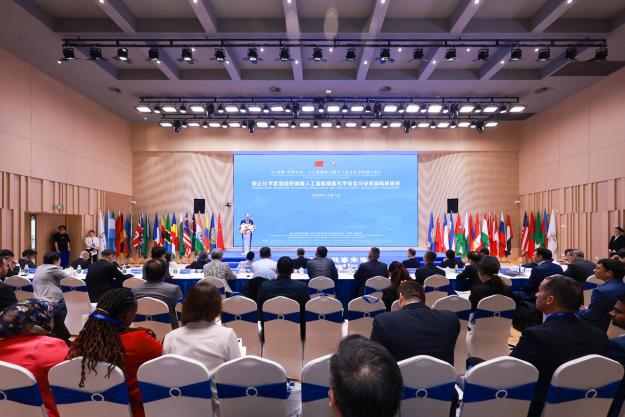The Organisation for the Prohibition of Chemical Weapons (OPCW) and the Government of the People's Republic of China, co-organised an international workshop on Artificial Intelligence (AI) and chemical safety and security management in Shanghai from 17 to 20 June 2025.
The four-day workshop brought together a significant number of participants and observers, including senior policymakers, scientific experts, and industry representatives, from 29 States Parties of all regional groups. Twelve experienced experts from 11 organisations-including representatives from China, other countries, and international institutions-contributed to the event.
Through featured lectures, roundtable discussions, and on-site visits, participants engaged in in-depth exploration of AI development and governance, its impact on chemistry, chemical research, and the chemical industry, as well as the opportunities and challenges it presents for implementing the Chemical Weapons Convention (CWC).
Under the theme "AI for Good and for All: Enhancing the Role of Artificial Intelligence in the Implementation of the Chemical Weapons Convention", the workshop served as a platform for States Parties-particularly developing and transitioning economies-to gain insights into valuable tools and knowledge for developing and applying AI technologies in the context of the peaceful uses of chemistry. The workshop also helped strengthen their capacity to implement the Convention and engage in global AI governance.
In his opening remarks, H.E. Mr. Zhang Yunming, Vice Minister of Industry and Information Technology of China, outlined China's position on harnessing science and technology to strengthen chemical safety and security, emphasising the supportive role of AI in CWC implementation. He put forward three key proposals: First, to uphold multilateralism and build global consensus regarding the Convention's compliance. Second, to promote fair and inclusive cooperation to enhance CWC compliance-related capacity building. Special attention should be given to the needs of developing countries. Third, to build a trustworthy and controllable governance ecosystem by promoting the responsible use of science and technology.

The Director-General of the OPCW, Ambassador Fernando Arias, delivered the Inaugural Address at the workshop. While acknowledging AI's ability to accelerate scientific and technological progress and improve production and safety within the chemical industry, he emphasised the importance of assessing and addressing the potential risks that AI may pose to the implementation of the Convention, particularly the threat of misuse by non-state actors.
The Director-General stated, "The OPCW has taken a proactive approach in this regard. Recent initiatives include the 'AI Research Challenge', the establishment of a Temporary Working Group on AI, and notably, the 2024 Global Conference on AI and the CWC held in Morocco. Today's workshop marks the first capacity-building programme organised by the OPCW specifically focused on AI and chemical safety and security. It is a direct continuation of the Organisation's commitment to leveraging emerging technologies for the benefit of all States Parties."
He expressed confidence that the workshop's outcomes would "contribute to ongoing discussions within the Organisation and, over the longer term, serve as a pilot for developing capacity-building programmes on AI and chemical safety and security, ultimately strengthening the States Parties' collective ability to prevent the re-emergence of chemical weapons in a rapidly evolving technological landscape."
Other senior officials attending the opening ceremony of the workshop included: H.E. Mr. Chen Jie, Vice Mayor of Shanghai; H.E. Mr. Tan Jian, Ambassador, Permanent Representative of China to the OPCW; and Deputy Director-General of the OPCW, Ambassador Odette Melono. Representatives from the Chinese National Authority were also in attendance.
Background
The International Workshop builds on a series of initiatives aimed at deepening the OPCW's understanding of AI and its implications. These include the 2024 AI Expert Meeting, the OPCW AI Challenge, and the 2024 Global Conference on AI and the Chemical Weapons Convention held in Rabat, Morocco, and the establishment by the Director-General of a Scientific Advisory Board (SAB) Temporary Working Group (TWG) on AI.
The workshop addressed emerging security risks associated with AI, including threats to chemical supply chain integrity, cyber vulnerabilities, and the potential misuse of advanced technologies for illicit chemical activities or terrorism. Participants also examined the rapid developments in AI technology and the evolving global governance landscape, with particular attention to best practices and regulatory approaches in China.
As the implementing body for the Chemical Weapons Convention, the OPCW, with its 193 Member States, oversees the global endeavour to permanently eliminate chemical weapons. Since the Convention's entry into force in 1997, it is the most successful disarmament treaty eliminating an entire class of weapons of mass destruction.
In 2023, the OPCW verified that all chemical weapons stockpiles declared by the 193 States Parties to the Chemical Weapons Convention since 1997 - totalling 72,304 metric tonnes of chemical agents - have been irreversibly destroyed under the OPCW's strict verification regime.
For its extensive efforts in eliminating chemical weapons, the OPCW received the 2013 Nobel Peace Prize.






